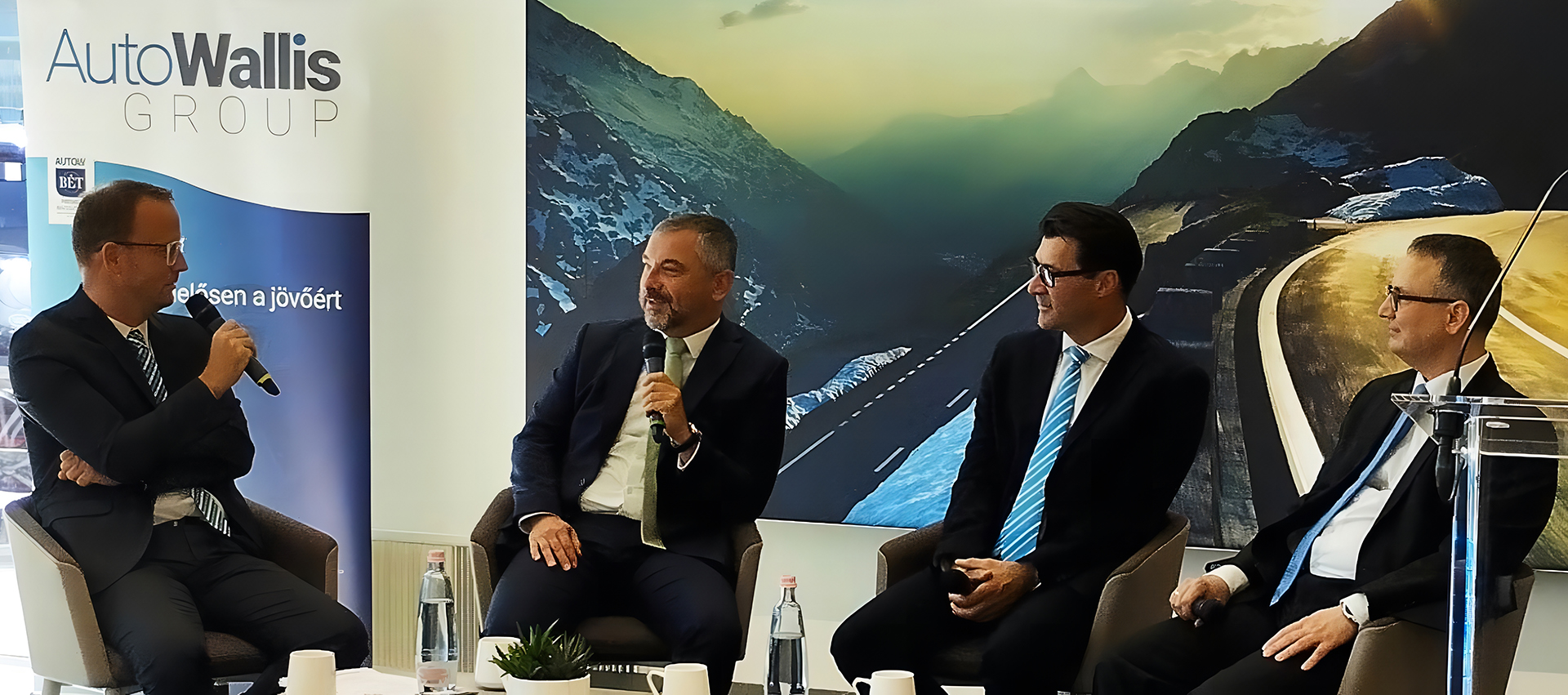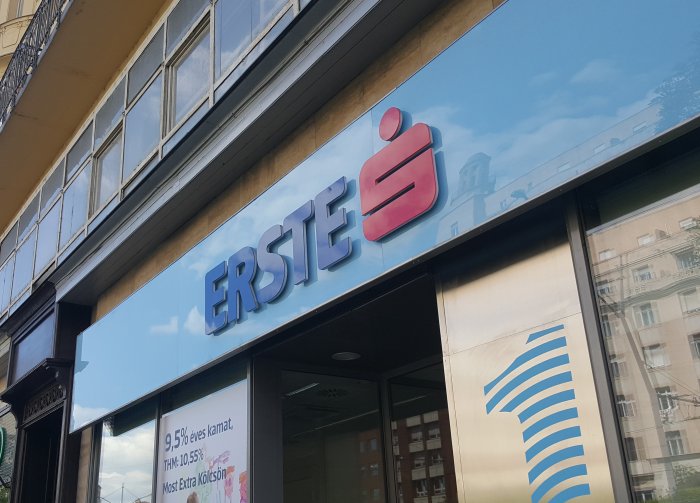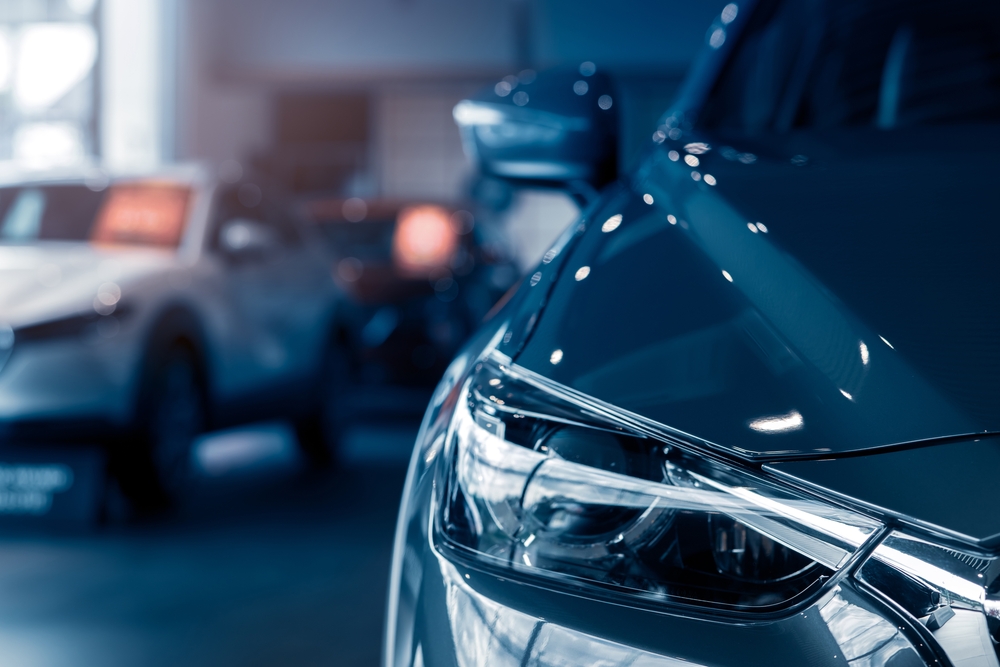AutoWallis Navigates Global Shifts in Balancing Growth and Chinese Competitors

Roundtable discussion at the AutoWallis Investors’ Day event on Sep. 20.
The AutoWallis Group’s public investor day revealed that, despite promising data and “robust growth,” the industry cannot ignore the advance of Chinese competitors. The event featured numerous presentations and roundtable discussions that painted a clear picture of the outlook for the Hungarian and regional automotive markets.
Máté Tóth István, deputy CEO of the Budapest Stock Exchange Zrt., noted: “The capital market maturity of the Hungarian corporate sector doesn’t even match the current level of economic development. It’s commendable for a corporate group to engage in the capital market.”
He also stressed the importance of promoting dialogue between investors and issuers and the high relevance of environmental, social and governance issues.
“Sustainability is now present in every segment of the financial and capital markets. There may be downsides, but ESG compliance is here to stay,” he said.
In his presentation, Gábor Ormosy, CEO of AutoWallis Nyrt., summarized the key events of the past year.
“We secured distribution rights for brands such as Renault, Dacia and Alpine, made significant progress online, acquired the fleet management business of Nelson and became the operator of the car-sharing platform Share Now Hungary,” he noted.
While there are overarching macroeconomic concerns about the Hungarian economy, Ormosy pointed out that AutoWallis had achieved “robust” results in the first half of 2023, with 25,634 vehicles sold (a 66.7% growth compared to the first half of 2022), revenues of HUF 194 billion (up 48%), a share price of HUF 16.9 (up 85%), and EBITDA of HUF 10.4 bln (up 50%).
“It is important to note that more than half of our revenues are generated internationally,” Ormosy added.
Challenges Ahead
Commenting on industry trends, he mentioned challenges such as the chip shortage, the EU’s decision to phase out combustion engines by 2035, lobbying in Germany in favor of synthetic fuels, and research into hydrogen fuel cells by some manufacturers.
“The aim is not to let the market become one-dimensional with the emergence of environmentally friendly vehicles. The technology race between powertrains is still up in the air,” Ormosy said.
A clear indicator of the challenge faced by the European car industry was on display at the IAA (Internationale Automobil-Ausstellung or International Mobility Show) in Munich, where almost half of the exhibitors were Asian.
“This year, there will be twice as many Chinese brands as two years ago,” said Ormosy.
AutoWallis’ capital market goals have progressed as outlined during the IPO, with key milestones achieved over the past five years, emphasized Gábor Székely, director of investor relations and ESG.
“In the last five years, our company has joined the BUX and BUMIX [Budapest Stock Exchange] indexes, moved up to the BÉT Premium category and carried out one of the largest public share offerings of the decade. Today, we have more than 4,000 shareholders,” said Székely.
Going forward, AutoWallis will focus on obtaining an ESG rating and preparing for green financing. There are plans to issue foreign currency and/or convertible bonds and to broaden analyst coverage, possibly including international firms.
“We will continue our share buy-back initiative in line with the needs of our employee share ownership program,” said Székely.
China: Both Ally and Rival
The significant push by Chinese manufacturers cannot be overlooked. In 2022, China exported 3.2 million cars, of which 522,000 went to the EU, and the Asian giant is also building up European manufacturing capacity.
“Before 2021, China exported less than one million cars. In 2022, it surpassed three million, overtaking world leader Japan,” said Ormosy. In the first half of this year, it has already reached 1.78 million, of which 534,000 are electric (an increase of 160%). The total could reach four million by the end of the year, he suggested.
He described the Chinese as both competitors and potential partners, even considering a UBS Group forecast that suggests, “The global market share of traditional carmakers could fall from 81% to 58% by 2030,” he says.
Retail models are evolving. Manufacturers are moving away from distributor sales models towards agency concepts. Despite the importance of digital, Ormosy insisted, “Physical car showrooms remain essential. Customers want to see first-hand the color of the car and how it suits them.”
Consumer habits are also changing, especially among young people and urban commuters, who are increasingly turning to car-sharing services.
“Last year, 44% of cars sold in the EU were electric or hybrid-electric. In Hungary, this share exceeded 5% for the first time. But these numbers are still tiny in the grand scheme of things. Especially in Central and Eastern Europe, the average age of the car fleet remains high at over 14 years and is increasing,” Ormosy pointed out.
Eying Foreign Investment
Despite securing a capital inflow of HUF 21 bln last year and a yield of more than 20% on AutoWallis shares, finding funding in the Hungarian market remains challenging. Attila Vágó, chief analyst at Concorde Értékpapír Zrt., expressed his concern.
“Despite the earnings, there’s an obvious liquidity problem. This underlines the need for foreign investors.”
Sustainability was a focus of the roundtable discussion. Székely, whose responsibility it is, described ESG commitments and developments as “fascinating. [….] However, specifics on expectations remain nebulous, and predicting consumer preferences becomes challenging in a world where young people are giving up meat for environmental reasons,” he added.
Ormosy revealed that the AuztoWallis portfolio now includes 22 brands. “Some of our acquisition processes took longer than two years, and negotiations with Chinese partners are still ongoing,” he revealed.
The discussion also covered dividend payments. Small investors pointed to a 30% real lag in share value due to inflation and drew contrasts with the 2021 interest level. Management, however, emphasized its preference for allocating cash flow to further development rather than dividend payouts.
One highlight of the roundtable came when the moderator asked the AutoWallis management whether they could imagine arriving at the Investor Day in a year’s time in a Chinese car.
“I can imagine arriving here in a Chinese car,” replied Ormosy. When asked when the 23rd brand would be added, the CEO replied, “I’ll be happy [if it is] by Christmas!”
This article was first published in the Budapest Business Journal print issue of October 6, 2023.
SUPPORT THE BUDAPEST BUSINESS JOURNAL
Producing journalism that is worthy of the name is a costly business. For 27 years, the publishers, editors and reporters of the Budapest Business Journal have striven to bring you business news that works, information that you can trust, that is factual, accurate and presented without fear or favor.
Newspaper organizations across the globe have struggled to find a business model that allows them to continue to excel, without compromising their ability to perform. Most recently, some have experimented with the idea of involving their most important stakeholders, their readers.
We would like to offer that same opportunity to our readers. We would like to invite you to help us deliver the quality business journalism you require. Hit our Support the BBJ button and you can choose the how much and how often you send us your contributions.










